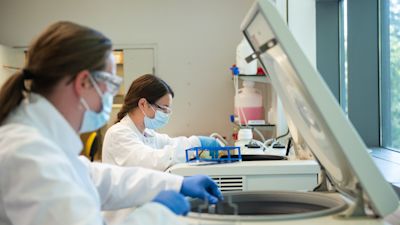Oxford Covid-19 vaccine: Could it be the one that ends the pandemic?
Tom Clarke
Former Science Editor

So the results are finally in.
The Oxford University-AstraZeneca vaccine is up to 90% effective in preventing Covid-19 and what’s more, no one who received the jab developed severe coronavirus or died from it.
This may well be the historic moment in the development of a Covid vaccine.
Although vaccines developed by Pfizer/Biontech and Moderna in the US are a step closer to being approved for use, the Oxford vaccine is cheaper, and being produced in more countries globally with up to 3 billion doses being available in 2021.
Also, compared to the other vaccines it is stable when stored at fridge temperature: a major plus for a global pandemic vaccine suitable for use in the developing world.
The results show that overall the Oxford vaccine is 70% effective.
In the clinical trial conducted in the UK, Brazil and South Africa volunteers received either two full doses of the jab one month apart or a half-dose followed by a full dose.
The full-dose regimen gave 62% effective but, counterintuitively, those that received the half dose/full-dose regimen had about 90% protection.
The researchers still aren’t sure why this is. But it could be a serendipitous boost for a vaccination campaign to halt the pandemic.
"These findings show that we have an effective vaccine that will save many lives," said Professor Andrew Pollard, Director of the Oxford Vaccine Group that developed the drug.
"Excitingly, we’ve found that one of our dosing regimens may be around 90% effective and if this dosing regime is used, more people could be vaccinated with planned vaccine supply.
"Today’s announcement is only possible thanks to the many volunteers in our trial, and the hard working and talented team of researchers based around the world."
The data is only preliminary, there are more volunteers recruited in the trial from whom results are expected soon.
But the team believe the data they have will be sufficient for the vaccine regulator in the UK and those elsewhere to approve it for use.
"The announcement today takes us another step closer to the time when we can use vaccines to bring an end to the devastation caused by SARS-CoV-2.
"We will continue to work to provide the detailed information to regulators," they said.
Assuming it does get approval, the first people here in the UK can expect to get vaccinated by the end of December according to AstraZeneca the commercial parter that is producing the vaccine.
They say they will have 4 million doses for use in the UK by the end of December.
By the end of March they expect to have 300 million finished — the UK government has ordered 100 million.
They have already licensed the vaccine for manufacture by other companies in Brazil, Russia and India.
It’s projected that combined, they could manufacture 3 billion full doses by the end of 2021.
Compared to the US vaccines that claim 90 to 95% effectiveness the results of the Oxford trial could look disappointing.
But according to the vaccine trial, their design required them to include all vaccination groups in their results — which acted to bring their apparent efficacy result down.
This, says the team, makes it too early to conclude their vaccine is not as effective as the others. “It’s like comparing apples and pears,” says Professor Sarah Gilbert.
Listen to our coronavirus podcast